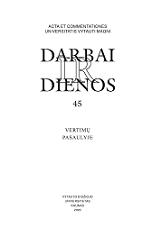Sąžinės genealogija. Nuo Kanto iki Rorty
Genealogy of conscience. From Kant to Rorty
Author(s): Jūratė BaranovaSubject(s): Philosophy
Published by: Vytauto Didžiojo Universitetas
Keywords: Genealogy; conscience; Kant; Rorty;
Summary/Abstract: The author of the article discerns two traditions in interpreting conscience: the first is based on a pressuposion of interiority stemming from Augustine’s inner dialogues with oneself, the other one interprets conscience as a sociogenetic phenonenon. She states that Kant and Heidegger continue the former, Nietzsche and Hegel – the latter. On the other hand, Heidegger, contrary to Kant, tries to avoid the interpretion the conscience with the help of metaphor, stemming from the immage of court, as a discussion between prosecutor and solicotor. Heidegger tries to interpret consciouness as only my own conscience and creates the image of conscience as a call, which paradoxically one can hear only in a mode of silence. Nietzsche and Hegel do not seperate the genesis of conscience from the content of social and historical life. Nietzsche explains it as a result of the fear to be left alone and to be with oneself. Hegel, differently to Nietzsche, gives to conscience an institutional meaning: he sees it as a form of universally reasoned structures: laws and principles. These two conceptions are radically antikantian. Ricoeur, the same as Nietzsche, suggests historical explanation of the genesis of conscience: through the movement of collective sin into interior inner guilt. But, contrary to Nietzsche and similar to Kierkegaard, Ricoeur discerns hope as the third stage of a possible overcoming of guilt. Rorty deconstructs the phenomenon of conscience following the dinamic understanding of person elaborated by Freud and tries to persuade that conscience depends upon the contingencies of place and time as does the poetical creativity. The metaphor of conscience he qualifies only as word from an old kantian vocabulary. On the other hand, the author of the articler concludes that in a process of changing words the conscience as a phenomenon of moral life does not disappear.
Journal: Darbai ir dienos
- Issue Year: 2005
- Issue No: 41
- Page Range: 101-113
- Page Count: 13
- Language: Lithuanian

